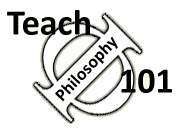Teach Philosophy 101
Free resources for
philosophy teachers!
"One of the most comprehensive, well-researched, and accessible guides for teachers that I have ever seen." James Lang, Chronicle of Higher Education (read full review of TΦ101)
Expanding the Canon
Traditional intro philosophy courses often draws primarily on classical texts and authors, most of whom were white, male, and European. For a variety of philosophical and pedagogic reasons, we should diversify our our readings lists. Here are just a few suggestions; please send additional ideas.
-
The American Philosophical Association (APA) Diversity Syllabi Project has dozens of syllabi for courses dealing with issues around diversity. These are typically not introductory courses, but this site is a treasure trove of possible materials, many of which might be suitable for an intro course as well.
-
Gail Presbey has an article on "Teaching about Racism and Sexism in Introduction to Philosophy Classes," with lots of great resources. The article is in the APA Newsletter on Feminism and Philosophy. 7.2 (2008): 5-10.
-
There are a number of anthologies that stress diversity in their selections, including: Gail Presbey, Karsten Struhl and Richard Olsen (Eds.), The Philosophical Quest: A Cross Cultural Reader, Eliot Deutsch, Introduction to World Philosophies, and Christine Koggel, Moral Issues in Global Perspective II: Human Diversity and Equality.
Approaches to Specific Topics
-
Privilege. Some students have a hard time understanding ways that they may be privileged over others. Peggy McIntosh's classic article "White Privilege: Unpacking the Invisible Knapsack" can be great discussion starter. Some students at Earlham used the same approach to talk about "straight privilege."
-
Radical Hope: Ethics in the Face of Cultural Devastation, by Jonathan Lear. Takes the experience of native Americans and the words of the last Crow leader (Chief Plenty Coups), as a way to explore how cultures think about their own devastation. Lear (who is a philosopher and psychoanalyst) draws on Aristotle, Plato, and other philosophical texts.
-
Sex and Love as Topics: Richard White has a good discussion of approaches to teaching a course on sex, love, and friendship. Since these are very important topics to undergraduates, some of his material could be adapted for intro courses as well. He also draws on some feminist material as well. See Teaching Philosophy 25.2: (2002) 111-121.
-
Alan Fox gives a detailed plan designed to help non-experts teach Daoism in introductory courses. Fox method focuses on helping the student understand controversies about the interpretation of these texts, so he hopes that his approach will both give students an awareness of eastern philosophy and an exercise in learning to think critically. See "Teaching Daoism as Philosophy: Teaching Thinking through Controversy." Teaching Philosophy. 30.1 (2007): 1-33.
Update: 2015
